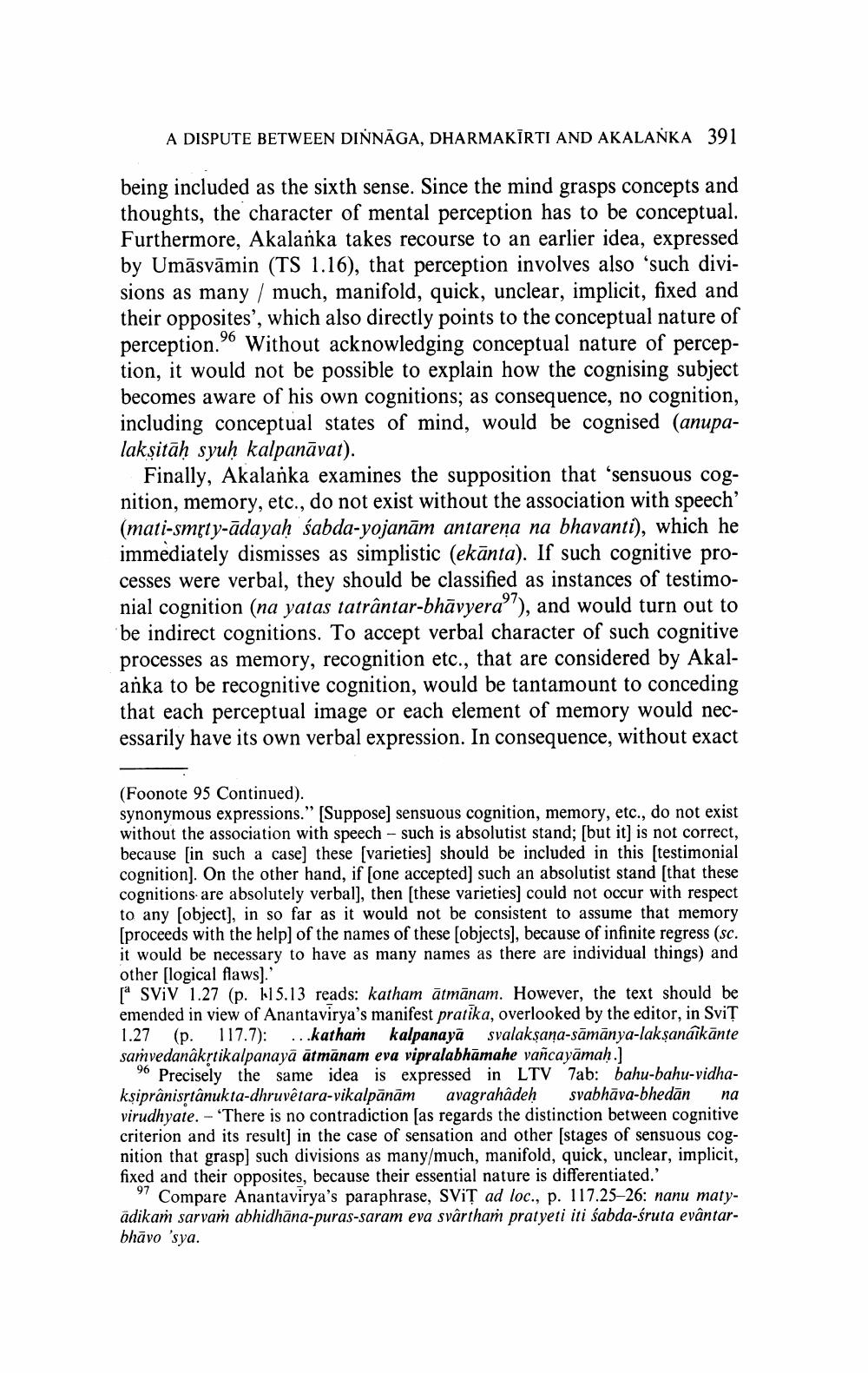________________
A DISPUTE BETWEEN DINNĀGA, DHARMAKĪRTI AND AKALANKA 391
being included as the sixth sense. Since the mind grasps concepts and thoughts, the character of mental perception has to be conceptual. Furthermore, Akalanka takes recourse to an earlier idea, expressed by Umāsvāmin (TS 1.16), that perception involves also 'such divisions as many / much, manifold, quick, unclear, implicit, fixed and their opposites', which also directly points to the conceptual nature of perception. Without acknowledging conceptual nature of perception, it would not be possible to explain how the cognising subject becomes aware of his own cognitions; as consequence, no cognition, including conceptual states of mind, would be cognised (anupalakṣitāḥ syuḥ kalpanāvat).
Finally, Akalanka examines the supposition that 'sensuous cognition, memory, etc., do not exist without the association with speech' (mati-smrty-ādayah sabda-yojanām antarena na bhavanti), which he immediately dismisses as simplistic (ekānta). If such cognitive processes were verbal, they should be classified as instances of testimonial cognition (na yatas tatrântar-bhāvyera”), and would turn out to be indirect cognitions. To accept verbal character of such cognitive processes as memory, recognition etc., that are considered by Akalanka to be recognitive cognition, would be tantamount to conceding that each perceptual image or each element of memory would necessarily have its own verbal expression. In consequence, without exact
(Foonote 95 Continued). synonymous expressions." (Suppose] sensuous cognition, memory, etc., do not exist without the association with speech - such is absolutist stand; [but it] is not correct, because [in such a case) these (varieties) should be included in this [testimonial cognition). On the other hand, if [one accepted] such an absolutist stand (that these cognitions are absolutely verbal}, then [these varieties) could not occur with respect to any [object], in so far as it would not be consistent to assume that memory (proceeds with the help of the names of these [objects), because of infinite regress (sc. it would be necessary to have as many names as there are individual things) and other [logical flaws).' sa sviV 1.27 (p. 115.13 reads: katham ātmānam. However, the text should be emended in view of Anantavirya's manifest pratika, overlooked by the editor, in Svi? 1.27 (p. 117.7): ...katham kalpanayā svalaksana-sāmānya-lakşanaikānte samvedanâkrtikalpanayā ātmānam eva vipralabhāmahe vañcayāmah.]
yo Precisely the same idea is expressed in LTV 7ab: bahu-bahu-vidhaksiprânisrtânukta-dhruvêtara-vikalpānām avagrahâdeh svabhāva-bhedan na virudhyate. - 'There is no contradiction (as regards the distinction between cognitive criterion and its result] in the case of sensation and other (stages of sensuous cognition that grasp) such divisions as many/much, manifold, quick, unclear, implicit, fixed and their opposites, because their essential nature is differentiated.'
* Compare Anantavirya's paraphrase, SVIT ad loc., p. 117.25–26: nanu matyadikam sarvam abhidhāna-puras-saram eva svârtham pratyeti iti sabda-śruta evântarbhāvo 'sya.




